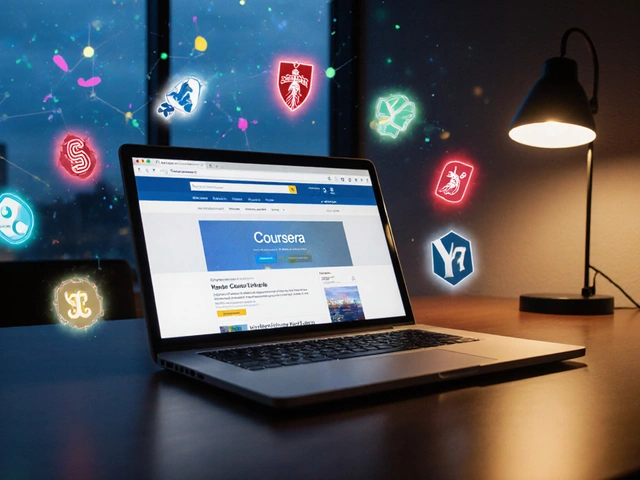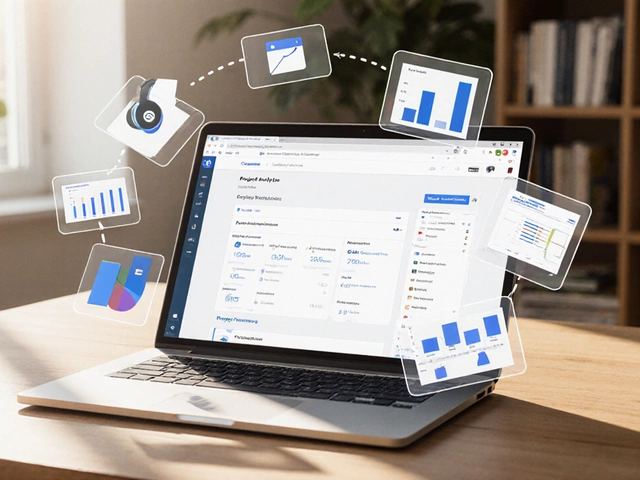
Gaining computer skills has never been more accessible, especially here in India, where a plethora of resources await every eager learner. Whether you're just starting or aiming to polish your skills, understanding where and how to begin can set you on a rewarding path.
Diving into this digital world doesn't have to be intimidating. With the right approach, you can navigate through the basics and gradually move into more complex concepts. From selecting the right courses that match your learning style to leveraging online platforms that provide interactive experiences, the journey to becoming computer-savvy promises to be exciting.
The hands-on practice will be your best friend in this endeavor, ensuring not just learning but mastery of skills that are increasingly becoming indispensable in today's job market. And all it takes is the right blend of dedication and curiosity.
- Understanding the Basics
- Choosing the Right Course
- Online Resources and Platforms
- Hands-On Learning
- Tips for Staying Motivated
Understanding the Basics
When you're starting your journey into the world of computers, getting a grip on the fundamentals is your first stepping stone. Computers run our lives in countless ways, and it all starts with understanding the hardware that powers them, the software that breathes life into them, and how these two facets combine to perform endless tasks. Imagine a computer as a vehicle; the hardware is the physical vehicle, while the software is the engine and driving capabilities. Both are vital, unique, and incredibly fascinating in their own ways.
First, let’s dive into the computer basics every newbie should know. The primary components include the CPU, which functions as the brain of the computer, and storage devices like SSDs and HDDs that hold your precious data. You'll also encounter RAM, the temporary workspace where tasks are executed. Understanding these components is crucial because they dictate how your computer performs and what kind of programs it can smoothly run. With this knowledge, you'll be better equipped to troubleshoot and even choose the right machine, tailored for your needs, demanding nothing less than impeccable performance.
On the software side, it’s important to grasp operating systems, like Windows, macOS, or Linux, which determine how you interact with your machine. These platforms serve as bridges between you and your computer's resources. Moreover, you'll also explore software applications that serve specific functions, enabling you to perform everyday tasks such as document editing, web browsing, and even coding. Each application has its interface and architecture, a reflection of the tasks it is designed to handle. The more you use them, the more intimately you’ll understand what makes a computer more than the sum of its parts.
The goal with learning computer skills is not just to operate these systems but to truly understand them. A staggering 90% of jobs today require some level of computer proficiency, underscoring the importance of being computer literate. To get started with ease, one might consider referencing Larry Page’s insightful words:
"The world is changing so fast, who’s going to lead? The nimble, agile, the right projects, the right people who make it happen."This quote resonates with the notion that by equipping yourself with foundational computer knowledge, you're better prepared to adapt and lead in an ever-evolving digital landscape.
To wrap this up, understanding the computer basics starts with familiarizing yourself with the key components and their roles. By breaking down each element, both in hardware and software, you initiate a journey that, while seemingly complex at first, becomes a path of discovery and self-learning. Creating a strong foundation will not only boost your own knowledge but also empower you with the confidence to explore this digital frontier further. As you move from a novice to someone who navigates technology with ease, you'll find that being tech-savvy becomes second nature.
Choosing the Right Course
When it comes to learning computers, picking the right course can make a huge difference in your educational journey. In India, there is an abundance of courses available, catering to a wide range of levels and specializations. The first step is to determine what your goals are. Are you a complete beginner wanting to grasp the basics, or are you looking to specialize in areas like programming, data analysis, or cybersecurity? Answering these questions can guide you towards courses that align with your needs. Many courses list their prerequisites, so make sure you check them to ensure you meet the necessary entry requirements before enrolling.
The options might seem overwhelming at first, especially with so many online platforms offering computer courses in India. Websites like Coursera, Udemy, and edX provide flexibility with both time and location, allowing you to learn at your own pace. Quite often, these courses are crafted by professionals from leading universities or companies, ensuring high-quality content. While some might offer full certifications, others might provide courses for free or at a discounted rate, making learning computers easily accessible to everyone. Choosing a course also involves considering factors like course duration, cost, and whether a practical or theoretical focus better suits your learning style. Keep an eye out for any course reviews or testimonials from past students to gain an insight into others' experiences.
Don't overlook local opportunities as well. Many Indian universities and private institutions offer diploma and certification courses in computer studies. Enrolling in a local course could provide personal guidance and networking opportunities that cannot be matched by online learning. Some institutions even offer night classes or weekend options for working individuals, making it feasible to balance work and studies effectively. In certain scenarios, enrolling in a local program can lead to internships, allowing you direct hands-on experience in the field.
"It's not just about learning to use a computer, but understanding how you can leverage its power to make real-world impacts," writes renowned technology educator and author, Nandan Nilekani, highlighting the significance of purposeful learning.
Furthermore, many emerging fields in computer science are branching out rapidly, and courses are constantly updated to include the latest technologies and practices. Staying informed about what skills are in demand can not only help you choose the right course now but also provide direction on which skills to acquire next. Consider popular fields like artificial intelligence, machine learning, and cloud computing as they continue to absorb a significant portion of the job market. Ensure the course you choose covers these or related areas if they're aligned with your interests.
| Platform | Course Options | Price Range |
|---|---|---|
| Coursera | 100+ Computer Courses | Free to INR 5,000 |
| Udemy | Over 200 Computer Courses | INR 500 to INR 3,000 |
| edX | Variety of Tech Courses | Free to INR 7,000 |
Lastly, when selecting your course, ensure it offers opportunities to practice what you learn through projects or assignments. Practical application of concepts reinforces learning and helps in retention, preparing you for real-world challenges. As you embark on this learning path, remember that patience and persistence play key roles. Learning computers is not a race, but a journey, and enjoying this journey can make all the difference in successfully gaining new skills.

Online Resources and Platforms
In this digital age, a plethora of online resources and platforms are available to learners across the globe, making the quest to gain computer skills easier and more convenient than ever. One of the foremost platforms that comes to mind is Coursera, which offers a variety of computer courses in India offered by prestigious universities worldwide. Through these courses, learners can delve into subjects ranging from basic computer operation to advanced programming and data science.
Another highly recommended platform is edX, known for its collaboration with leading institutions, like MIT and Harvard, providing courses that can cater to both beginners and advanced users aiming to refine their skills. Notably, Khan Academy also provides comprehensive tutorials on computer science, tailored for users who prefer self-paced learning, which is a boon for those juggling multiple responsibilities.
"The only way to learn something is to do it. Constant practice ensures mastery." — Richard Branson
For more interactive learning, platforms like Codecademy and freeCodeCamp offer hands-on exercises that let you practice coding in real-time, which is invaluable when trying to build practical expertise. These platforms allow individuals to learn from their mistakes and incrementally master complex topics through gradual progression.
Open-source resources such as GitHub also provide remarkable flexibility for learning computers. At GitHub, beginners can explore various coding projects, collaborate with other coders, and learn the nuances of programming by diving deep into open-source projects. This real-world exposure is invaluable because it offers the chance to not just learn coding theories but also see their application in practical endeavors.
The power of community-driven platforms such as Stack Overflow should not be underestimated. Here, one can engage with thousands of developers and tech enthusiasts to get answers to questions that arise along the learning journey. The platform's structured Q&A format means that it is easy to search for specific problems and solutions.
Approaching Online Learning Effectively
Using these platforms effectively requires a strategic approach. First, setting clear learning goals can help maintain focus and motivation. Secondly, dedicating specific times of the day to learning ensures consistency. Additionally, taking detailed notes during online lectures or video tutorials can be immensely beneficial, serving as a quick reference in future.
In India, where a significant digital transformation is underway, these online platforms provide a unique opportunity. The adaptable nature of these platforms means they can fit into varying schedules and learning paces, making them ideal for diverse learners. Whether seeking to enhance computer basics or expand into niche areas of technology, the curated content on these platforms is designed to empower learners to achieve their desired skill levels.
To summarize, leveraging the vast array of online resources and platforms effectively transforms the learning curve from steep to manageable, offering learners a guided path to computer literacy and proficiency.
Hands-On Learning
When it comes to mastering computer skills, there's no substitute for hands-on learning. This approach not only reinforces theoretical knowledge but also builds confidence through practical application. Being actively engaged while learning is a game-changer and often leads to a deeper understanding and long-lasting competence. Especially in a country like India, where digital transformation is rapidly evolving, getting your hands busy with real tasks can dramatically boost your learning curve.
Working with tangible tasks helps to bridge the gap between theory and practice. When you interact directly with a computer system, each click and command becomes an opportunity to learn something new. You start developing a sense for troubleshooting, a critical skill in the IT domain. Such tactile learning also invites curiosity, prompting learners to explore beyond the prescribed syllabus. As you stack these experiences, your brain forms neural pathways that contribute to skill retention.
There's a unique satisfaction that comes from solving a problem through applied skills, which reading alone often cannot provide. This kind of engagement fosters a proactive mindset, pushing learners toward continuous improvement in their computer journey. For example, one might begin by building a simple website, which may inspire learning more advanced coding languages like JavaScript or Python. In the words of Bill Gates, "Learning to write programs stretches your mind and helps you think better, creates a way of thinking about things that I think is helpful in all domains."
Enrolling in workshops and coding bootcamps is another excellent way of implementing hands-on learning. These learning environments are designed to be interactive and immersive, offering real-time problem solving and peer collaboration. Participation in such settings is often more impactful as it mirrors real-world scenarios, preparing learners for challenges they may face in the field. Whether you choose in-person sessions or virtual meet-ups, these settings play a crucial role in enhancing your practical knowledge.
Having access to new technologies and tools is essential in practicing hands-on techniques. Be it software development kits, advanced IDEs, or hardware components like Raspberry Pi, the ability to experiment with these tools can significantly influence your learning outcome. The internet is abundant with resources to acquire these tools at minimal or no cost. And for structured guidance, popular sites like Coursera and Udemy offer courses that emphasize practical exercises and real-life projects alongside theoretical lessons.
Computer courses India often include practical labs where students can work on projects that require creative problem-solving and critical thinking. These labs are usually equipped with the latest software and hardware technologies to ensure a comprehensive learning experience. This practice ensures that students aren't just learning for the sake of it but preparing themselves to handle IT challenges in the professional world. As the demand for tech-savvy professionals in India grows, hands-on experience could distinguish you from the competition.
Another effective method of hands-on learning is participating in open-source projects. The open-source community provides a platform for budding programmers to collaborate on real-world projects, receive feedback, and contribute to the development of software used worldwide. Access to a global community of developers offers the chance to learn diverse coding practices and standards, which can be invaluable experience. This involvement not only adds to your portfolio but enhances your reputation in the tech world, possibly opening doors to new career opportunities.

Tips for Staying Motivated
Embarking on the journey to learn computer skills can be thrilling yet challenging. Staying motivated is key to navigating this path successfully. One effective way to maintain enthusiasm is setting clear, achievable goals. Begin with small milestones that are within reach, such as mastering basic operations before moving to advanced tasks. Achieving these goals provides a sense of accomplishment and fuels further progress. Visualizing where you want to be in a few months or a year can also serve as a powerful motivator, keeping you aligned with your broader objectives.
Integrating your new skills with real-world applications is another excellent motivator. Whether it's creating a simple spreadsheet to manage personal finances or building a blog to share your passion with others, applying what you've learned can reinforce your knowledge and make the learning process more enjoyable. This kind of exploration not only solidifies your understanding but also uncovers new learning opportunities. Consider joining online forums or communities where you can discuss your experiences and gather tips from fellow learners who are on a similar journey.
Understanding that setbacks are part of the learning process is crucial. Everyone encounters difficulties, and it's essential to view them as learning opportunities rather than roadblocks. When you face a challenging concept or task, take it as a chance to deepen your understanding. As the renowned author J.K. Rowling once said in a speech at Harvard,
"It is impossible to live without failing at something unless you live so cautiously that you might as well not have lived at all – in which case, you fail by default."Embrace the challenges as part of the rewarding journey toward acquiring new skills.
Keeping your learning environment engaging and diverse can also help maintain your drive. Switching between different resources or methods can refresh your perspective and keep boredom at bay. Utilize a mix of books, videos, online tutorials, and hands-on practice. Experiment with a variety of approaches to see which one resonates most profoundly with your learning style. Don't shy away from exploring platforms such as Coursera, Udemy, or Codecademy, where a wide array of computer courses in India are tailored to various skill levels.
Lastly, celebrate your achievements, no matter how small they may seem. Recognizing progress reinforces positive learning habits and keeps motivation levels high. Share these achievements with friends or family who can provide encouragement and celebrate your journey with you. Remember that the road to mastering computer basics is not just about reaching an endpoint but also about enjoying the process and discovering new potentials along the way.




